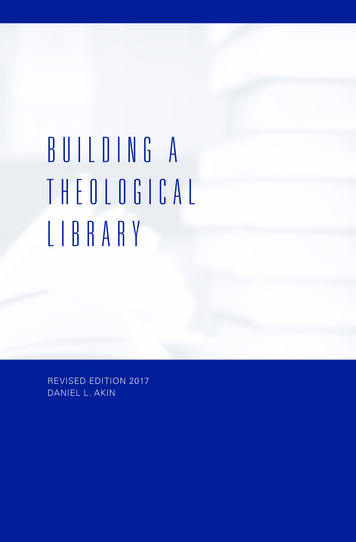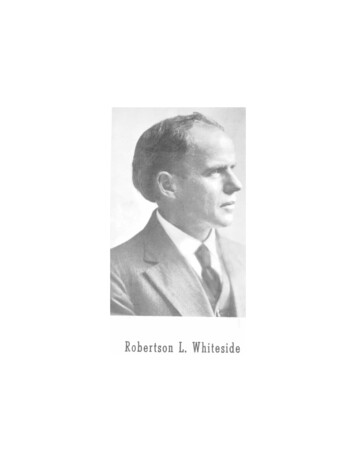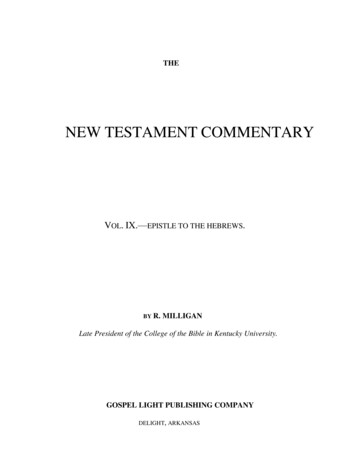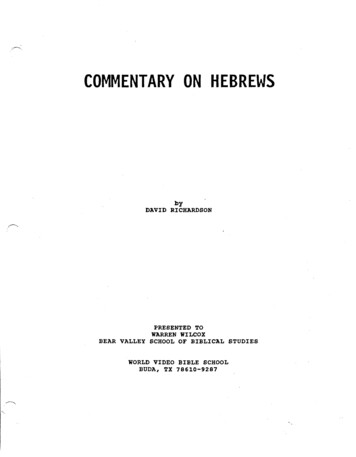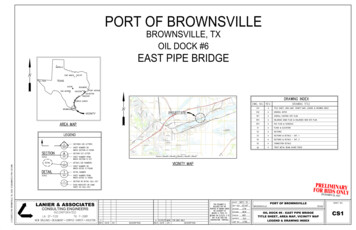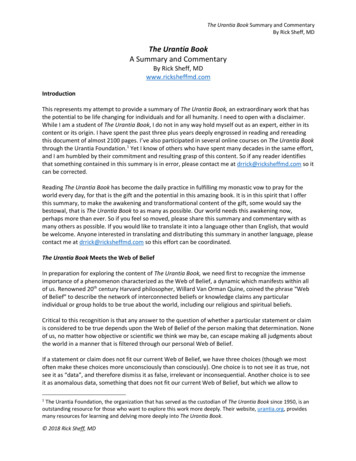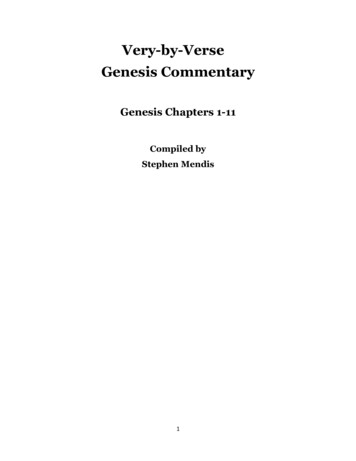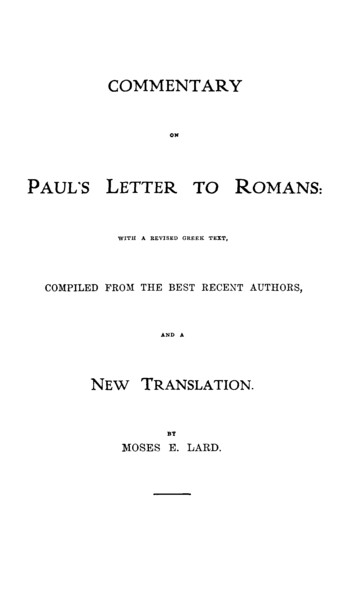
Transcription
COMMENTARYOJ PAUL'SLETTERWlTHCOMPILEDA REVISEDFROM THETOGREEKBESTROMANS:TEXT,RECENTAND ANEWTRANSLATION.BYMOSES E. LARD.AUTHORS,
PREFACE.In December, 1863, I announced my mtention of Writing, at some futureday, Providence favoring, a commentary on Paul !I Letter to the disciples InRomeSince that announcement, many untoward events have conspired todefeat my purposeAmong the chief of these has been the want of adequateleisureBut, at last, I am thankful to say, I have been enabled to bnng thework, such as It IS, to a closeI here present It to the public, with a singleregret, which IS, that It IS not more worthy of the great theme upon whichIt has been wnttenIn stud) Ing the Letter In question, I had been constantly Impressed withthe com iction that no commentary on It, with which I was acquainted, wassufficientlyfree from the influence of particular scholastic tenets to meet thewants of those who desire to know the simple truth, as It IS In Christ, withouthavrng It formulated In the schools, or modified by special theories of religIOn I greatly felt the need of a work, the sole aim of which should be, todetermine precisely what Paul means, regardless of what that meaning favorsor disfav orsSuch a work I could not commandI soon discov ered thatthose who have wntten on the Letter are for the greater part, either intensely CalvInIStlC, on the one hand, or Intensely anti Calvirustic, on the otherPaul wrote to favor neither of these parties, hence, neither of these partres,as such, can Interpret him,AgainThe extreme doctnne of justificationby faith onl y , h I SO completely engrossed the mind of commentators, smce the sixteenth ce nturv,that It seems never to have occurred to them, as even a possible fact, tintPaul may not have been wntlng In their exclusiv e interestThe) h iveregarded him as certainly of their order, and, as a consequence, have wntten him up Into a partisan, only more parus in than themselvesThe resulthas been that In many places their works are a complete perversion of thetruth, and not an exhibiuon of ItFrom these wnters I could denve nobenefit, except where their chenshed doctnne was out of SIght.The present work IS an effort to supply, so hr as the abrhty IS possessed,the deficiency here complained ofI onlv wish I were able to feel that It ISsuccessfulI fear, however, the reader may find himself compelled to seeIn me the same fault whu.h I have, With constant reluctance, seen In othersStill I am not WIthout have that this rna) not prove soThe sole aim, then, of the present Commentarv 1 ; to .rsccrt-un the exactsense of Paul, and to express It In terse, clear LnghshHow far this has
PREFACE.been accomplished, I dare not venture to say.Of what I have aimed todo, I am a perfectly competent judge; of what I have actually done, I maybe a very poor one.My Commentary proper, then, consists, in brief, in an effort so to amplifythe Apostle's meaning that the English reader can not fail to catch it. Thismeaning, besides, where it has been thought necessary, I have attempted todefend both by offering in its support such affirmative arguments as occurred to me, and by endeavoring to show the futility of such as have beenused to subvert it. In the latter work, it is true, I have not attempted much.One charge I have felt solicitous not to be exposed to; namely, the chargeof passing shyly over the difficult passages, and of dwelling with plethoricfulness on the easy ones.The very opposite has been my aim. Accordingly, I have studied the former passages till I have not been able to realizeadditional light from farther study.I have then, but not sooner, setdown my conclusions.Of their merits I do not speak.Of the latterpassages I have said, I hope, enough, but I have certainly not intended todwell on them at length.The reader will notice that I have never seemed to think whether my expositions were favoring Calvinism, Arminianism, or any other ism. Andthis is strictly true. Indeed, I have been concerned solely with the sense ofPaul, and with neither the sense nor non-sense of others.I have felt most anxious, and, I trust, not unsuccessfully, to avoid theappearance of learned display, so common in works of this kind. Myambition has been, so far as practicable, to make a book for the common reader.I have, therefore, refrained from unintelligible allusions, the use of foreignwords, and citations of unfamiliar authors j in fine, from everything whichcould wear the appearance of mere display, without being, at the same time,positively necessary.In this respect, I trust, I have not been studious invain.It remains to add only a few more items, before putting an end to thispreface. And, first, in regard to Lexicons to the New Testament, I feel ita duty to say, that I have not always found them as trustworthy as I couldhave wished.They, like commentaries, are usually very perceptibly tinctured with the peculiar sentiments of their authors.The same remarkapplies to grammars.Such works I have heen compelled to use withcaution.In the next place, I have not been enabled, it may be hazardous to say,to derive from the so called usus loquendi of the New Testament, and theinductive method, the aid which others claim to have derived. Certainly Ihave constantly kept both in view; but I have usually found that each passage has a meaning so peculiarly its own as not always to be very obviouslysusceptible of elucidation by light derived from other passages.Conse-quently, I have endeavored to ascertain the sense of each separate passage,by whatever means seemed fullest of the promise of success, without slavingit specially to anyone method. I could not feel safe in any other course.Nor have I stopped to offer learned criticisms upon the Text, on all ee-
j'UKYACK.viicasions, whether they were demanded or not. I have felt content, in manyplaces, to gIVe the sense in a plarn way and pass on.Neither have I cumbered every clause and verse with references to numerous parallel passages. My reasons for this are two: I. Strrct parallelism in the New Testament, outside of the Four Gospels, is very rare. 2.Such references are never consulted.I have hence felt unwilhng to be atpains to cite them.In the matter of English moods and tenses, I have not endeavored toconform them to Greek models. Only when the mood or tense was the fact,or part of the fact, to be communicated, have I felt it necessary to be extremely careful. In all other instances I have used the hbcr ty 01 wntingEnglish, not Greek.MOSES E. LARD.LExINGTON, Ky.,FURUARY2, 187S.
INTRODUCTION.Of Paul's ancestorswe know nothing,except that he was ofthe Tnbe of Benjamm.the youngestson of JacobOn the roadbetween Bethel and Bethlehem,and not far from the latter place.that tribal ancestor was bornHIs mother, the beloved Rachel,died In giVing him birth, but not till she had named 111m Benons,60n of my sorrow, which Jacob subsequentlychangedto BenjaminThc Trrbe, though the least, save one, among those of Israel,was not Without drvtrnctronSaul, the first king of Israel, was aBenjanumteas w a-, al .o Mordecai,certainly one of the most honored and dl .tlnglll heddehverer s the nation ev er hadAs warrrors, the BU11lmlnlte'i were renowned,being most unernngbowmen, who uvually, It seems, drew the string With the left hand.Andthrs fact ilia) serve to accountfor their dexterrty , forthe acquiredsk ill which comes from laborioustramlng IS alwaysmore accurate rh.m th.it which IS more natural, because less CUltivatedBut of all the sons of Benjarmn, to Saul of Tarsus must beawardedthe foremostplaceIf we except the royal heir of J udah, In the per ;on of J evus of Nazareth,It IS not extravagantto1S8\ that the worldIS to day more Indebtedto him than to anyother rn.m that e ver lived In ItTo 'iay that this IS due to him asmvpir ed, would be true, but lt does not lmpalr the truth of theremark.HISPARENTS.Re ;pectlng Paul's parents we hav e not, in the New Testament,even one satrvf.rctor v i e m IlklIe alludes to his father once. andmention I., made. Acts XXIII 16, of his sister and her son, both ofwhom appe,lr to hav e been ll\lng at the time In JerusalemHowdeeply we reg Iet the w.mt of even one full histoneline touchinghi., motherThat must have been a noble woman to whom Godga\ e ;0 noble a 'ionIf all nations delight to call Mary "blessed,"how also would thousandshave deep pleasureIn cherishmgthename of the fdVOlUI l Lmnah or LOIS, that ga\e bn th to one whosen.rrne 1 ;to stand mse p.rrablv hnk ed, thloughall time, With thatof the 'l\ lor of the worldDid she ever live to hear him preach'Chn'itand him crucified"?Or did he ever have the exquisiteple avur e of "huI" 1l1g'In baptism"the form that had hushed himWIth lull rbrcs throughmany a long tardy I11ght, at a time whenthe vast Gentile wor ld, w hom he w as subsequentlyto wake to thesublime activitres of Ianvomed hfe, were slumbenngon through
INTRODUCTION.their still darker night of Idolatry?Did she live to see him standIn the forefrontand hottest of the fight wrth " pn itual w ickedness," when no one could v ie with 11I1llIII "l.tbol ?\\'.15 It e v erher happinessto "let hun down by the wall In a ba kct,'and sofoil the malice of demoniacfoes Old that mater nul hand e v erwash the blood from his heroic back, after he had I ecerv cd . fortystripes save one"?DId she ev er IIlSplre him w ith brave "OIUS,saYlllg, "Countall things but loss, my son, for the excellencyof the knowledgeof ChnstJesus," while the "car e of all thechurches"was upon him?The! e are questionsover which wehave a melancholypleasureIn thrnkmg,but which we hav e nomeans of answeringPLACEOFHISBIRTHFortunatelyfor us, the Apostle himself gives us the place of hisbirthIt was Tarsus In Crhcia, "no mean city," a rem.n k whichhistory abundantlyJustifiesFor Sti abo tells us that III i efinemcntand love of learning,It equalledor ev en "1lI passed Alc-caudr iaand Athens'Tarsus stood on the banks of the IIVel C) clnu-, ind broadand fertile plain, skIrtingthe nort heavternshoi e of theMedrterraneanIt lay almost due north of Jelu"alem,and Justsouth of latitude 37Its location was an adrnn able one, and weare conseq uently not surprisedto learn that It was little less famousfor Its commercethan ItS lettersTo the east of It, on the otherSIde of the mount AmanusI ange, lay Mesopotamia,the cadycradle of the human family,to the west of It, and east of the geansea, lav that vast and densely populatedmland country,which subsequentlywas the scene of so many of Paul's laborsThe city had formei Iy been under the sway of the Gi eeks, and Itspopulationwas still laq;ely GI eek , but at the time of Paul's bu thIt wa-, a "fl ee" Roman City, so made by AugustusCresar,Here,in "free" Tarsus, Paul was born, althoughIt was not from the errcumstanceof the city's being flee that he denved his "free birth."DATEOFHISBIRTHUNK OWNThe year 111 which Paul was boi n has shai ed the fate of mostof the dates of those eai ly days, and been lostThei e IS apassage in a sermon ascribed,but With questionableauthoi rty, toCht ysostom, from wluch It has been mferi ed that he was bor nthe second year of our era,A D 14 has also been named as theprobable)ear of 11Is birthBut these dates, thoughnot whollybev ond the lange of truth, ale conjecturalIndeed,we pos"essno data fi om which the tune of hIS l»: th can confidentlybe deterrnmedHe was a "youngman" at the time of Stephen'sdeathTlus much IS cei tam , and It fixes hIS bu th WIth tolerable cei tamtytowardsthe close of Herod'slife, or III the earl) part of that ofArchelausThis was the per rod of Rome'sgl eatest splendor.Augustuswas at the hlght of 111'; power,and the world wasresting a little fi orn the long martial struggles of the pastTheprovinceswei e enJoYll1g uncommonadv ant,lges,and ev en theJews were exempt, for the time, fi om impenal ty r anny, and from
IN1.RODUCTION.slaughter at the hands of IdolatersRoman couriers shot rapidlya.long every highway,and Roman eagles were the emblemsofpower in almost e1.cry landJohn thc ba ptrst was still 111 the"htll country" of Judea, and thc Savior .rt C.1l pe n trj with Jo ephin NazarethAboutthis time Paul must have made his firstappearanceas a httle boy in the streets of TarsusI\OT"''''OWNHOWliltCA'\fETOBEFREEJlOR How Paul came to be free born IS unknownHIs father mayhave purchaseda Roman crnzenshrp,which was not uncommon,or It may have been conferredon lurn, or on some of his ancestors,as a rcw.n d for drstingurshedservrces renderedin some of thoseW"I in w hich Tarsus sided With RomeThe latter IS the morepr ob.ihle h) pot he-o sFor If Paul reflected, m any marked degrec,thc chat acte ustics of hi" father. w lu ch 1 ; cert.unly not Improbable,then that father was sure to attain distmctronin whateverCresar'sc.ruve he might espouseHe would be no 'man to play an obscuresecond partIn thc thickevt of the fight his shield would alwayshe l,ul nc , while no onc would excel him In unfaltenngdevotionto I\I chiefFor tlus dev otion he would be honored With thefir vt .h -tmctronof a RomanMore hkely thus, I thmk, thanother wise, Paul became "frce born"HISSTAYI TARSUSHow long Paul lived m Tarsus, or to what degree he had heeneducatedbefore lea \ mg for "the feet of Gamaliel,"can only beconjecturedIt IS not very probable that the parents of one whow a, always ready to boast of bemg a "Hebrewof thc IIcbl e ws,"and of belongmgto the "stt rctest sect" among the J e w s, wuuldvalue very highly a Gentile educationThe vc!'ry rev ei se IS themore likelyAnd then the PUI po ;e of his parents to educate himin the metropolisof their own country, would render them theless concernedabout Ius bClng educatedin TarsusBesides, theimmatureage at which Paul must have gonc to Jerusalem,toju tlf) his own rcrnai k th.u he was "hi ought up" there,inconsrstent With the suppositronof a liberal education at homeTheprobaluhtyIS that about all that can he said of him in till'; particular 1 ;that he was revpectablveducated, for a youth, befoi e he leftfor JerusalemFUI t he i mot e, hi;' u-,e of theGI eeklanguageISthat of a highly endowedman by nature, who had learned tospeak It as a ver n.rcul.rr \1.rth [("Ie.it fluency and won del ful force,i atherthan that of one who had been long and rucelv trained Inthe sc hools of the mastersAll these circumstancespoint to a novery elaborate Gentile education.I"PECUNIARYCONDITIONOFHISPARE"TSThe pecumary condition of Paul's parents can har dlv have beenvery lowThey had long lived III Tarsus, and latterlv in mostprosperoustimesTal sus \\ as a thrifty place, With a 1.11 g-c eastern,wester n and rnaratimetrade,and the Jews are pr ov er brally athnft)peopleBesides, the ambition to educate their son III the
INTRODUCTIO:ll.best school in Jerusalem, points to a proud family, conscious ofthe means to accomplish their wish.The abject have no suchaspirations as this family had.THEInSOCIALPOSITION.Moreover, the social position of Paul's parents must have beenhigh. The faultless honor, proud bearing, independence, delicacy,and gentle tact which always di tingui hed their son, are the sureindexes to a cultivated family of line standing.Paul boasted otheing a citizen of "no mean city," and no doubt could have added,with equal truth, ami a member of no mean family.INTHESCHOOLOFGAlIIALlEL.How long Paul remained in the school of Gamaliel, or how longhe had been out of it, if out at all, when he is introduced to us, onthe occasion of Stephen's death, as the "young man at whose feetthe witnesses laid down their clothes," we are without the meansof saying. He tells us that he was "taught according to the perfect manner of the law of the fathers", which could hardly haverequired less than from four to six years. But he may have livedin the city a much longer time than that.The expression, "ayoung man," applied to him at the stoning of Stephen, is mostlikely to be taken with some latitude.A mere stripling couldhardly have gained the notoriety which he gained about that time;nor would one have been confided in by those in authority as weknow he was. Neither is it likely that the Savior would call amere youth to act the conspicuous and responsible part whichPaul acted from the very day of his baptism on. I should thinkthen, that we may safely assume Paul to have been little less, ifany, than thirty years old at the time of his call. Certainly hiscall at an earlier date is not probable.But be these conjecturesas they may, from his call on, we know much of his history;whereas, from that event back, we know very little.HISPERSONALAPPEARANCE.Even tradition, no matter how unsatisfactory, is not devoid ofinterest for us, when it relates to one concerning whom we are soeager to catch every hint that can lead us to a still better acquaintance with him. We are, therefore, ready to hear, though thelegend be a wholly untrustworthy one, how. according to ancientrumor, Paul personally looked.One thing is certain, he musthave looked some way. and as probably this as any other, and asprobably a hundred others as this. Tradition, then, believed itwould seem in the ages immediately succeeding him, pictures Paulfor us as slender in body and low (it is worthy of note, that wenever think of him as a man of powerful build); and it fartherdraws him as so distorted or lame as at times to provoke the sneerof his enemies. I lis head, though bald, is represented as a nobleone; his features were bold and strikingly Jewish; his complexionwas so fair as quickly to reveal every change in his highly sensitive feelings; his eyes were bright and gray: his eyebrows heavy;
lDJINTRODUCTIONhis countenancewas indicativeof high mtelhgenceand deepthought,his expressionWaS hopeful,pure and sweet, willie hisamiable face charmed ev ery body and I epul-ednoneSuch IS thebeautifulpicture which fond traditionhas handed down to us ofthis great manIt IS pleasant to linger on ItS features and indulgethe hope that they at e not wholly IdealHISPOWERSOFE . DUUANCE.AlthoughPaul was most probablya man of slender bodilymold, still he must h.ive been wonderfullyendowedwith powersof enduranceHe had one of those tough, delicate organismswhich .tppear always fading, and yet never fadWith a body ofanythmgelse than steel, he could never have endured the hardships which we know he cndui cd , and we know not a tithe ofthose through which he must have pasvedTrue, much of this ISattributable,no doubt, to the SUCCOlll1g hand of his Master, whowas his never fallll1g help 111 need,but It IS not sufficienttoaccount for every thll1gPaul, as Paul sunplv, and not as supernatui ally sustained,IS the only solution of much of the problem othi-, lifeNo one, I veritut e, ever rose hIgher above that low typeof men called "sensual," than heOn the one hand, he was thevery embodimentof thought and sensrbrlrty , and on the other, thev e i v negationof the Eprcu r eanIn a word, he seems to havebeen a sll1ewy WOIlMn III for 01, but a Romanof the Romans111mte llec t, continuityof PUI pose, Will powcr,and never flagglOgencrgyillS!'-.ATURALAUTHORITY.Paul was the Napoleonof the apostles10 authontyN at thatas an apostle he was more highly endowedthan they, for he wasnot, but 111this particularnatui e had been lavish With himHew as a "born king" alnc.ng men, whether "makIng tents," or proclaimmg the "unseal chable nches of Cln ist " Nor IS the trait onewhich the hlOgl -ipher can ventureto overlookSome men werenev er m rde to COJl1m.lI1d any thll1g, not even a cartThe womenhenpeckthem,and even their own childrennever obey them.N iture has never commissionede) e or mouth or any thll1g else 10their caseBut not vo PaulHIS velY look was a mandate whichonly needed artrculatronto be complredWithBut, although thusendowed,he was usually, among his brethren,"gentle as a nursecherishmgher clukh en"Only when occasioncalled for It washe "such, when present,as he was by letter, when absent"Nowhere was this characterrvticof the Apostle ever more conspicuously displayedthan 111the presence of gl eat crowds,composedlargely of his enemiesUsn-illy he at once awed them into silence,and seldom failed to leave them With a "divIsion"In the church,Paul's enemies could not stand before him for a moment,nor as arule could they do so out of It, except when maddenedto fl enzy.And when we reflect on the countlessforms III which msubordinationmade Its appearanceamong the e.u ly disciples, we canreadily discoverthe Wisdom of the SavIOr In selectrng a man of
INTRODUCTION.Paul's faculty to quell it. One unclothed with his natural authority could never have achieved what he did. Perfection in a publicfunctionary requires that the authoritative word shall be' secondedby the authoritative look.HISINTELLECT.In intellect, I think it probable that Paul's admirers have usuallyoverrated him. Great he certainly was, but that he was transcendently so, is not in evidence. He was a man of commandingintellect-no more. Nor was it necessary that he should be more.There were other traits of mind far more essential to his successthan mere greatness.He needed a mind of faultless balance, amind of perfect symmetry, one of consummate normal action andgreat exactitude, rather than otherwise.To such a mind divinetruth reveals itself more naturally than to any other; and thensuch a mind can more readily comprehend divine truth, and bejuster to it, than any other.Whatever of greatness such a mindwould lack, would be more than compensated for in the fact ofinspiration.Now, the whole known history and labors of Paulcome in to confirm the justness of the estimate here placed uponhim. He was always equal to the crisis, be that what it mightno mean proof of greatness.He always did just the thing heshould have done, and said just the thing he should have said.This indicates eminent mental harmony, and exquisite mentalaction. We never feel, when studying Paul, that he should havedone this or that, or should have acted thus or so. We neverhave an improvement to suggest, either upon matter or manner.This points to a mind of astonishing perfections; and such a mindwas Paul's.INSPIRATION.As it is impossible to study Paul for a moment, or indeed anyother apostle; or to attempt any proper estimate of him, either asspeaker or writer, without the subject of inspiration constantlyobtruding itself upon our notice, this seems a suitable place topause a little on that curious topic. Besides, other reasons suggestto me the necessity for a slight notice of the subject in this connection. Of course it must be briefly treated here.\Vhat, then, is inspiration? I answer, that in its fulness, it comprehends five things:I. The personal presence in the inspiredof the Holy Spirit; 2. The communication to his mind of ideas;1. Selecting the words in which these ideas shall be spoken orwritten; 4. Endowing him with powers of speech; 5. Conferringupon him power to work miracles, in order to confirm whatevermessage he delivers. On each of these items I think it well toadd a few reflections:I.The personal presence in the inspired of the Holy Spirit.If I am asked how the Holy Spirit can personally dwell in ahuman being, I reply, I do not know.Neither do I know orunderstand how the human spirit can dwell in a human body, butI profoundly believe the fact. And so in regard to the personal
I TRODUCTIO:-;.indwellingof the Holy Spirit.I believe the fact, though I amwithout an explanationof the moue of it.If the Holy Spirit bea person, and infinite in power, which I believe is generally conceded,then to affirm that it can dwell in a humanbeing,iscertainly not an assertion necessarilyfelo-de-se. It is the affirrnation of a simple matter of fact, for the confirmationof which asingle passage of holy writ is sufficient;and that we have suchpassage, no one acquaintedwith the Bible will deny.The Savior,10 speakin to the apostles of the Spirit, said:"He dwells withyou, and t s in you." John xiv: 17, revised Greek text.ThisBettles the question of the Spirit's indwelling.But the mere indwellingof the Holy Spirit is not inspiration,althoughit is the antecedentto it, and necessary condition of it.For, conceivablythe Spirit might dwell in a person, and yet cornmunicate to him no ideas, in which event we should not hold himto be inspired.Somethingmore, then, than mere indwellingisessential to inspiration.2. The communication to his mind of ideas.No matter whetherthese ideas be original or revived, whether they be ideas of thingsin heaven or things in earth, the communicationof them to themind is essentialto inspiration,and withoutthem there is noinspiration.But the mere communicationof ideas is not enough;for were the process of revelation to stop here, it would evidentlystop at an incompletestage.Anotherstep, therefore,is necesaary.3. Selecting the words in which the ideas communicated shallbe spoken or written.\Vere the ideas simply communicated,andthe endowedthen left to select the words in which to impartthem, we can readily see how great blunders might be committed,and disastrous results follow.The Holy Spirit alone that communicates the ideas, is fully capable of selectingthe words whichwill precisely convey them; and this it does.See 1 Cor. ii: 13.4. Endowing with the power tif' speech. The lanvuage whichwould have to be used in conveyingthe ideas might be unknownto the endowed.In that case it would certainly h(" necessary toinvest him with the power to use it.Whetherthis would berequisite,where the languageto be used was known.call no·confidentlybe said, though I should think not.Apparentlywerea knownword, containinga given idea, to he sugg-estpcl to themind, no necessity can be discoveredfor supernaturalaid [0 utterit; and where such aid is not required,it is not given5. Conferring f'1r.verto work miracles in order to con/i.-m 'what.ever message is delivered. The Holy Spirit may dwell in a man;may communicateto his mind ideas;ma.y select the words inwhich to convey them; may endow with utterance;and still, unless it confer the power to confirm,all is manifestlylost: forbelief, without proof, is Impossible.Now, these are the elementsthat enter into the conception ofinspiration;and how completelythey secure the human familyag-ainst error in the matter of revelation,can readily be seen.
INTRODUCTION.When now I speak of Paul as inspired,no one can misunderstand me; nor, which is far more important,provided what hasjust been said be correct, can anyonemisunderstandwhat inspiration itself is.It is proper to add, that only when acting as an apostle, orwhen preaching the gospel, or writing for Christ, can Paul or anyone else properlybe said to be under the influence of inspiration.When not acting as an apostle, or acting merely for himself,there is no evidence that Paul was any more effectually protectedagainst error, or blunders, or sin, than any other discreet and prudent christian.He may have been, to be sure; but if so. the factis not known.But wheneverhis acts concernedChrist,orinvolved the welfare of human beings; whenever,in other words,he acted officially, then even a fault was not allowable.Confessedly, this places the matter of revelation on high ground,but noton ground too high to be perfectly safe.d';TOWHOMDIDPAULWRITE?We are at last enabled to abandonthe region of tradition andconjecture,and to enter that of certainty.or at least probability.The Letter in hand was written to "all who are in Rome, belovedof God, called holy"; in other wordv, and briefly, it was writtento all christians living in Rome at the time.But it was written tothem as individuals,and not as a body or church.TIllS is aremarkable difference between the present Letter and some otherswritten by Paul.Those are addressedto churches as such; thisis addressedto individualsas such.Indeed,churchunity 01organizationis not even once alludedto or recognizedin theLetter, unless it be implied in ch. xvi: 17.How now shall weaccount for the circumstance?The Apostle writes a letter to themetropolisof the world,which, as a point of divergenceforchristian light and influence, was certainly without a superior,ifit had any equal.Here large numbers of discipleshad eithercongregatedfrom other countries, or been converted on the spotdisciples who had never enjoyed a visit from any apostle; and yetPaul says nothing to them upon the subject of church order orgovernment,upon the duties of overseers and deacons.Why theomission?Simply, I conclude,because nothing of the sort wasnecessary;for had it been so, it is inconceivablethat the Apostlewould have failed to mention it.This, as an indefinitegeneralreply, must, I presume, be accepted as correct.But why was theinstructionin questionnot necessary?Thatthe disciplesinRome had among them men endowed with gifts of the Spirit iscertain.Among these gifts the Apostle himself mentions prophecy, teaching. exhortation. and rulin.!f. Now, I conclude that thesespiritual men had so admirably ordered and regulated the churchor churches, if there were several, as to render any thing fromPaul on church urganizationand g-o\'crnmentunnecessary:This1 deem a fair answer to the question, as well as a fair solution ofthe difficulty.
cviINTRODUCTION.As to the suppositionof some, that, at the time whenPaulwrote, there was no church In Rome, in the strictly local sense ofthe term, and that this is the reason why none IS taken notice of,I think It so Improbable as to need no lengthy replyIt IS certainly vicious logic to infer from the silence of the Apostle thenon existence of a churchThat there was no one single church,or consolidatedbody, I think most hkelyThe better suppositionIS, that there wereseveral churches.We have one mentioned.and It is hardly possible that this was all.The order of the daywas, especially when regulatedby mspired teachers,to form thedisciples, 10 a given locality, into a church, and appoint over themthe prescribedofficers.The proper inference is, that Rome wasno exception to this rule.COMPOSITIONOFTHECHURCH.What was the compositionof the church or churches in Rome?1 put the questron alternatively,because, as just said,
commentary oj paul's letter to romans: wlth a revised greek text, compiled from the best
